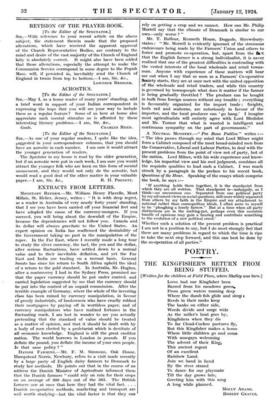EXTRACTS FROM LETTERS.
MONETARY REFORM.—Mr. William Henry Flavelle, Mont Millais, St. Helier, Jersey, writes : "It is with deep regret,
as a reader in Australia of very nearly forty years' standing, that I see you have been carried off your financial feet and have adopted the cause of the currency-mongers. If you succeed, you will bring about the downfall of the Empire, because the dependencies will not follow you. Canada and its dollar will always gravitate to the United States. An expert opinion on India has reaffirmed the desirability of the Government taking no part in the manipulation of the rupee. In the Far East, where I recently made a long tour to study the silver currency, the tad, the yen and the dollar, after serious fluctuations, have settled down to a normal value and to their inevitable deflation, and yet the Far
East and India are trading on a normal basis. General Smuts has since his return to South Africa upheld the ideal of a return to the gold standard. In Australia, Mr. Hughes, after a controversy I had in the Sydney Press, promised me that the paper currency should be put under control, and carried legislation suggested by me that the currency should be put into the control of an unpaid commission. After the terrible example of Germany, where the whole of the investing class has been ruined by currency manipulation, in favour of greedy industrials, of landowners who have cruelly robbed their mortgagees by paying off in worthless paper, and of currency manipulators who have realized fortunes in the fluctuating mark, I am lost in wonder to see you actually pretending that the standard of value should be treated as a matter of opinion, and that it should be dealt with by a body of men elected by a proletariat which is destitute of all economic knowledge. England is still the great creditor nation. The world borrows in London in pounds. If you deflate the pound, you deflate the income of your own people. Is that sane policy ? "
DANISH FARMING.—Mr. F. M. Simmons, Oak House, Hampstead Norris, Newbury, refers to a visit made recently by a large party of English dairy farmers to Denmark to study her methods. Ile points out that in the course of an address the Danish Minister of Agriculture informed them that the Danish farmers "could rely on rain for their crops on an average of 300 days out of the 365. The British farmers saw at once that here they had the vital fact. . . . Danish co-operative methods, marketing and transport are well worth studying—but the vital factor is that they can
rely on getting a crop and we cannot. How can Mr. Philip Morrell say that the climate of Denmark is similar to our own—only worse ? "
Mr. T. Balfour, Kenneth House, Dogpole, Shrewsbury, states : "Mr. Morrell is evidently ignorant of the strenuous endeavours being made by the Farmers' Union and others to foster and promote co-operation, but, apart from the fe,?.t that the English farmer is a strong individualist, it is never realized that one of the greatest difficulties is contending with the vested interests of the local wholesale and retail towns- man. Anyone with experience of these matters will bear me out when I say that so soon as a Farmers' Co-operative Society starts, they are at once met with the united opposition of the wholesale and retail traders, and while this country is governed by townspeople what does it matter if the farmer is being gradually throttled ? The produce can be bought in bulk from foreign sources without any trouble ; everything is favourably organized for the import trade : freights, both rail and seaborne, are notoriously in favour of the importer, and the local producer can 'go hang.' I imagine most agriculturists will entirely agree with Lord Bledisloe and Mr. Tumor that what is wanted is intelligent and continuous sympathy on, the part of governments."
A NEUTRAL MINISTRY.—" Pro Bono Public° " writes :— " The idea passes through my mind that Lord Milner might
form a Cabinet composed of the most broad-minded men from the Conservative, Liberal and Labour Parties, to deal with the present problems from the point of view not of party, but of the nation. Lord Milner, with his wide experience and know- ledge, his impartial view and his cool judgment, combines all the requisite qualities to lead such a Cabinet. I was much struck by a paragraph in the preface to his recent book,
Questions of the Hour. Speaking of the essays which comprise the book, he says :— ' If anything holds them together, it is the standpoint from which they are all written. That standpoint is—unhappily, as I think—an uncommon one. Separated from one political party by my advanced views on social questions, still more widely separated from others by my faith in the Empire and my attachment to national rather than cosmopolitan ideals, I often seem to myself to be "ploughing a lonely furrow." But at a time when all party distinctions are in the melting-pot, perhaps even this eccentric bundle of opinions may gain a hearing and contribute something to the evolution of a new political creed.'
Whether such a solution of the present problem is practical I am not in a position to say, but I do most strongly feel that there are many problems in regard to which the time is ripe to take the next step forward, and this can best be done by the co-operation of all parties."






































 Previous page
Previous page